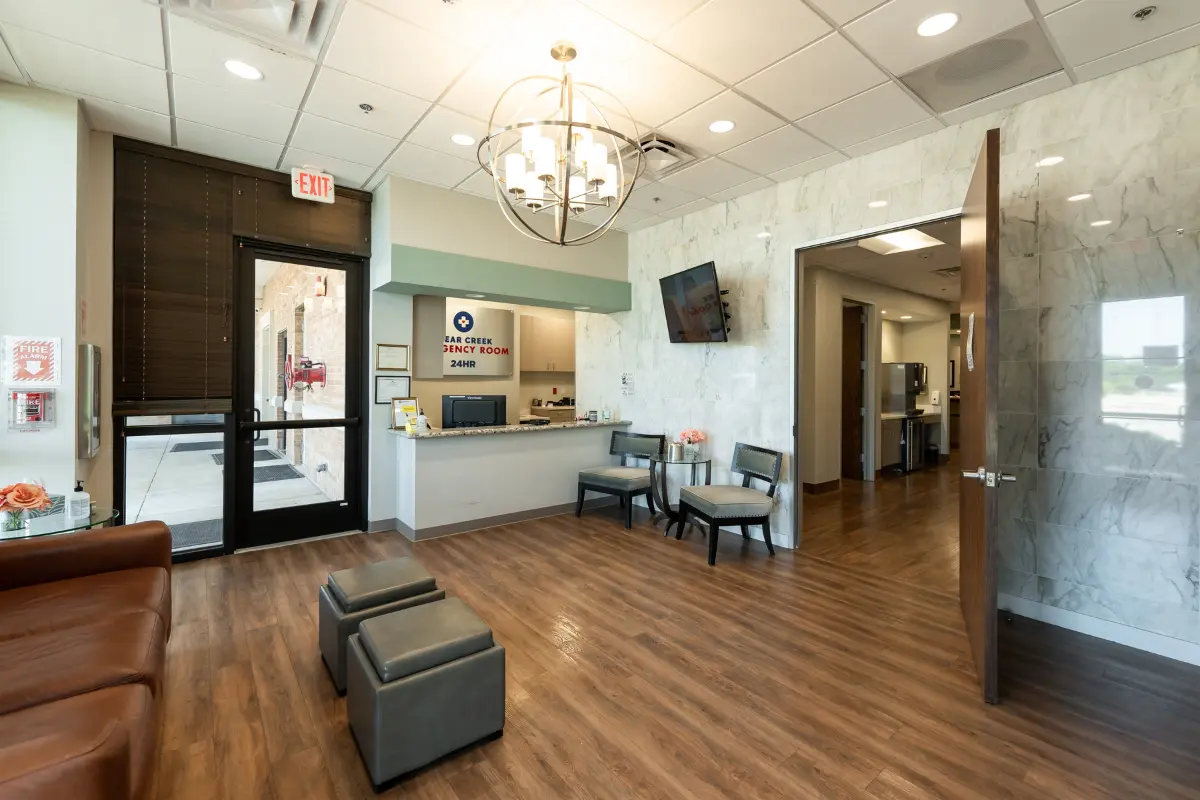Emergency Room for Chest Pain Treatment in Houston, TX
When chest pain strikes, immediate medical attention is crucial. Village Emergency Centers provide fast, comprehensive care to assess and treat the underlying causes of chest pain, ensuring your health and safety are our top priority.


Why Choose Us?
Why is Houston Community Choosing Village Emergency Center for Chest Pain Treatment?
- Little TO No Wait Time
- Board-Certified Doctors
- All private Insurances Accepted
- 24/7 Emergency Care
- Pediatric Emergency Department
- Convenient Locations
- CT Scan, Ultrasound, & X-rays
When You Should Go to the Emergency Room?
Chest pain can often be a source of alarm, inducing thoughts of serious heart conditions. While it’s true that chest pain can indicate a heart attack, it’s important to understand that it can also be a symptom of numerous other, less severe conditions. Knowing the variations in chest pain, the accompanying symptoms, and their potential implications is crucial in discerning when medical intervention is required.
At Village Emergency Centers, our professional medical team is at your service, ready to provide top-notch urgent care for chest pain. With our advanced diagnostic technology and deep understanding of chest pain causes and effects, we are well-equipped to investigate your symptoms and condition. Whether your pain is a persistent ache, a sudden sharp sting, or a throbbing discomfort, don’t ignore it. Prioritize your health and well-being by scheduling an appointment with us.
Causes of Chest Pain
Chest pain can be caused by a wide range of factors, some more severe than others. It’s always best to err on the side of caution and seek medical attention if you experience any chest discomfort. Possible causes of chest pain include:
Heart-related Issues
As mentioned earlier, chest pain can be an indication of a heart attack or other conditions such as Heart attack, Angina, Aortic dissection, or Pericarditis.
Lung-related Issues
Pneumonia, pleurisy, and pulmonary embolism are just a few of the many lung conditions that can cause chest pain.
Digestive Problem
Gastroesophageal reflux disease (GERD), gastritis, swallowing disorders, pancreas, and gallbladder issues can also trigger chest pain.
Mental and Emotional Factors
Anxiety, panic attacks, and stress can lead to chest pain. It is important to address these underlying issues to manage chest pain effectively.
Musculoskeletal Problems
Injuries, arthritis, and muscle strains can also cause chest pain. These also include Costochondritis, Sore Muscles, and Injured Ribs.
Lung Problems
Asthma, bronchitis, pulmonary embolism, pleurisy, collapsed lung, pulmonary hypertension, and chronic obstructive pulmonary disease (COPD) can cause chest tightness and discomfort.
Treatment for Chest Pain
Emergency chest pain treatment will depend on the underlying cause. While some conditions require immediate treatment, others may be managed with medication, lifestyle changes, or therapy. Our medical team at Village Emergency Centers is dedicated to give best urgent care for the chest pain and finding the most effective and suitable treatment plan for you.
Medications
Aspirin
A commonly used medication for pain relief and fever reduction. It also has anti-inflammatory properties.
Artery Relaxers
Medications that help relax and widen the arteries, improving blood flow and reducing blood pressure.
Thrombolytic drugs
Medications are used to dissolve blood clots and restore blood flow in conditions such as heart attacks and strokes.
Blood thinners
Medications that prevent blood clot formation, reduce the risk of stroke, heart attack, and other clot-related conditions.
Antacids
Medications that neutralize stomach acid, providing relief from heartburn and indigestion.
Anti-anxiety medications
Medications are used to treat anxiety disorders and related conditions by reducing excessive anxiety and promoting relaxation.
Surgeries
Angioplasty
A medical procedure used to widen narrowed or blocked blood vessels is typically performed by inserting a balloon-tipped catheter and inflating it to open up the artery.
Stent placement
A technique where a small mesh tube called a stent is inserted into a narrowed or blocked blood vessel to help keep it open and improve blood flow.
Surgical Repair of The Arteries
A surgical procedure is performed to fix damaged or diseased arteries, often involving removing or bypassing the affected section of the artery.
Bypass surgery
A surgical procedure in which a new pathway, or bypass, is created to allow blood to flow around a blocked or narrowed artery, restoring proper blood flow to the heart or other organs.
Emergency dissection repair
An urgent procedure is to repair a tear in the inner layer of the artery, known as a dissection, to prevent further complications and restore blood flow.
Lung reinflation
A medical intervention is used to reinflate collapsed or partially collapsed lungs, often done by inserting a tube into the chest to remove air or fluid and allowing the lung to expand again.
Major Locations of Chest Pain
Sudden Chest Pain Left Side
If you experience sudden pain on your left side, it is crucial to seek immediate medical attention by going to the emergency room. In addition, be aware of other symptoms that may indicate a heart attack, such as pain spreading to your jaw, left arm, or between your shoulder blades, along with symptoms like nausea, dizziness, sweating, a racing heart, or shortness of breath.
Sudden Chest Pain Right Side
If you experience sudden pain on your right side, it is crucial to promptly seek medical attention in the emergency room. This symptom should not be dismissed, as it could potentially indicate a heart attack. At Village Emergency Centers, we specialize in providing heart attack treatment in Houston, ensuring you receive expert care when it matters most. Whether you’re searching for 24 hour emergency cardiac care near me or need trusted heart attack treatment in Houston, our team is here to deliver the highest standard of care around the clock.
Other Times Go to the Emergency Room for Chest Pain
If you experience sharp chest pain on either side of your body, it is important to seek medical attention. Persistent pain, shortness of breath, radiating pain, or changes in heart rate and blood pressure are all indicators that you should call a doctor or go to the emergency room Houston.
What Questions Your Doctors Might Ask
- When did your chest pain start?
- Is the pain getting worse?
- Does your pain radiate to other body parts?
- How would you describe your pain?
- Do you have other signs and symptoms?
Diagnoses of Chest Pain
The doctor will use several tests to diagnose your chest pain, including but not limited to:
- Electrocardiogram (ECG or EKG)
- Blood work
- Chest X-ray
- Echocardiogram
- Chest MRI
- Stress tests
- Angiogram
Treatment After the ER Visit
After you visit the emergency room, it is of utmost importance to diligently adhere to any instructions provided by the medical team. This may encompass diligently taking the prescribed medications as per the recommended dosage and frequency, as well as making necessary adjustments to your lifestyle to effectively manage and mitigate the impact of your condition. By conscientiously following these instructions, you can ensure the best possible outcome for your health and well-being.
Once you’ve been treated at the emergency room for chest pain, it is crucial to follow up with your primary care provider. This follow-up care is essential to monitor your recovery, adjust your treatment as needed, and ensure that your health is being managed effectively.
Emergency Care for Chest Pains in Houston, TX Area
If you are experiencing chest pain, don’t hesitate to visit Village Emergency Centers for prompt, professional, and personalized care. Our modern facilities are equipped with advanced technology, including Ultrasound, X-Ray, CT Scan, and comprehensive Medical Imaging, ensuring accurate diagnosis and effective treatment for any urgent medical issue. Our expert medical team is dedicated to providing top-notch emergency care tailored to your needs. Trust us with your health and well-being – we’ve got you covered. Visit one of our locations in the Houston, TX area for expert emergency care.
FAQs About Chest Pain

What Our Patients are Saying About Our Emergency Care Services
Amy Trim
League City
“This emergency room is absolute AMAZING. Both my husband & I have been treated here & have had phenomenal experiences. They always treat you with love & respect. They run all of the tests that are needed, but they don’t add a bunch of unnecessary test. We all know that doctors are human, but sometimes I think some doctors forget that but not at Clear Creek Emergency Room. Dr. Luna, Dr. Cruz, and Rommel, RN are amazing!”
Keyla H
Clear Creek
“I recently had an experience at the Clear Creek Emergency Room that exceeded my expectations. The staff was incredibly fast and efficient, ensuring that I received the care I needed without unnecessary delays. I was particularly impressed by great bedside manner of Doctor Cruz and highly skilled nurse Rommel who attended to me. I truly appreciate the dedication and efficiency of the entire team. Thank you for providing such exceptional care!”
Isela Luna
Jersey Village
“I was pleased to know there’s a place to get urgent care when needed. I was taken care off promptly and efficiently. Dr. Luna treated me with respect and was very informative about my health condition. I actually was in and out of there in 3 hours. Everything was explained to me and I am happy to know there’s a place like this Jersey Village ER. Hopefully, I will not need to return but if I need to I know I will get great care. Thank you Dr Luna and staff.”
